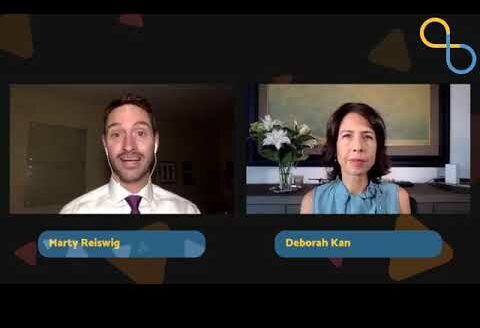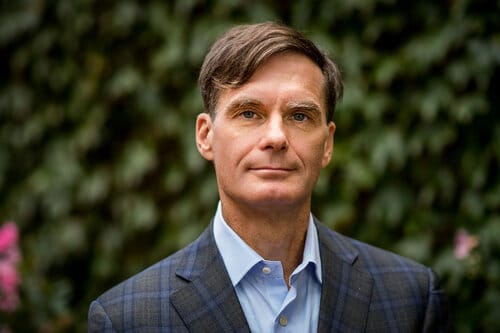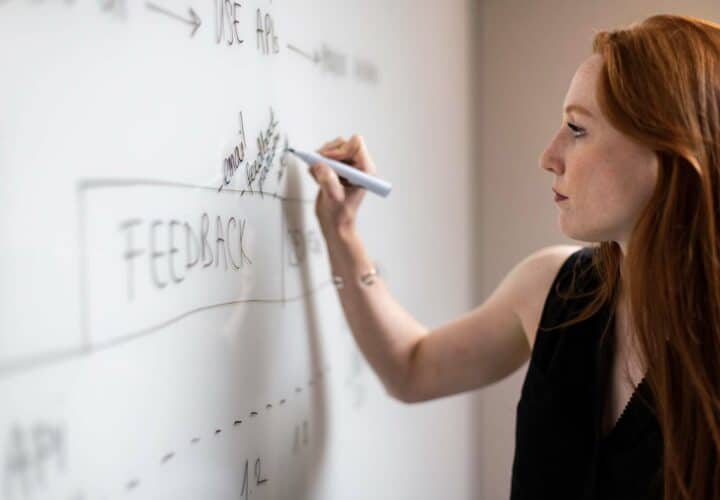Following an Alzheimer’s diagnosis, college president and author Rebecca Chopp embarked on a new journey — one of advocacy and art.
When author and academic Rebecca Chopp went to her yearly physical in 2019, she wasn’t expecting to learn that she has Alzheimer’s. In fact, she was thrilled to report that for the first time in her life, she was getting around nine hours of sleep a night, as opposed to the four hours of sleep a night that was typical of her life in a demanding career in academia: Chopp was, at the time, the Chancellor Emerita of the University of Denver. Before that, had served as the president of Colgate University and of Swarthmore College, as well as dean at Yale University Divinity School.
While Chopp was feeling great about her health, she did happen to mention, however, that she had gotten lost on her way to the doctor’s office.
“As we know, way too many primary care physicians do not pick up on these clues, but she said, ‘I’m going to give you, if you don’t mind, a short-term memory cognition exam,’” Chopp recalled of the appointment. “I said, ‘Oh, sure, fine,’ knowing I would pass it with flying colors. But I didn’t.”
Chopp hadn’t noticed any early signs of cognitive decline that may foreshadow neurodegenerative diseases like Alzheimer’s. While looking back, she realized there were other signs: not wanting to do academic events; increased social anxiety. “It was that brilliant, perceptive doctor who knew not only the signs about memory, but some of the other signs that can show up,” she said.
It was that physical, and her doctor looking closely, that set Chopp on a new path. After the failed cognitive test, Chopp went through the diagnostic process, which included hours passed at a memory clinic and with a neuro-psychologist. All results pointed to Alzheimer’s.
Since her diagnosis in 2019, she has become an accomplished painter. Now also focusing on advocacy, Chopp is a founding member of Voices of Alzheimer’s and a board member of the Colorado Alzheimer’s Association. She is also an avid hiker, reader, and dog lover.
In this Being Patient LiveTalk, Chopp shares her experience with what she calls “not my Grandma’s Alzheimer’s” and the role advocacy has come to play in her life.
She also shares insights on the lifestyle and prevention measures related to Alzheimer’s that play a prominent role in her upcoming book, Art, Spirit, Body: Ways to Live While Dying from Alzheimer’s.
Watch the whole conversation, or read a transcript from the discussion below:
Being Patient: You were diagnosed in 2019, so it’s a fairly new journey. How did you approach the subject of Alzheimer’s with your high-profile job?
Rebecca Chopp: It was incredibly scary and confusing. I didn’t want to take people into my confidence early on because I didn’t want to put them in that position. When you’re the leader, you have to think: what kind of position am I putting a person in if I give them this kind of knowledge? I had a wonderful neurologist and a wonderful psycho-neurologist who helped me with this. So, I got the formal diagnosis in March, and the academic year at the University of Denver ends in June. My husband and I decided that I would step down that quickly.
I probably could have kept it up for a year, but I knew I had a great team who could take over. I was very worried about making a mistake. Also, I needed to spend time with my family. One neurologist told me I probably had three years of good time before I started forgetting things and having trouble. If I only had three years, I wanted to spend time with my family. I also wanted to have time to spend with myself because I had worked 16 hours a day for at least six days a week for 20 years.
Being Patient: How did you tell people that you’ve been diagnosed, and what was the reaction to it?
Chopp: When I decided I would step down, the first thing I did was to tell my senior staff, the chief of staff, and the various vice presidents. We were a good team, and pretty much everybody cried. The reaction is twofold: to cry and say, “I can’t believe it.” There was just a lot of sadness and grief for me, and probably as soon as they walked out of the room, there was also incredible concern about what would happen. I decided very early on that I needed to tell the board chair, as boards of trustees oversee private universities.
I had a wonderful chairwoman named Denisa, and I will never forget her kindness. I went to her house, I called her, and said I have to see you now. We sat on her porch. Her mother has Alzheimer’s and I told her. She just grabbed my hand, and we sat there and cried, and looked at the mountains. Then, I told the board of trustees. They had a similar reaction, as did my family and friends. So, the only negative reaction was this notion that “I can’t believe it, you don’t have it, they’ve got to be wrong.” That’s not really negative. It’s just disbelief. So I was very fortunate. When I went public, which was beyond just our circle, I wasn’t ready to use the word Alzheimer’s. I said, “complex neurological disorder.”
Being Patient: Well, Alzheimer’s is a scary word. There’s a stigma. You stereotype it with a certain type of person and image in mind.
Chopp: As you know, I’m writing a book on my experience, and I think I may title it “Not My Grandmother’s Alzheimer’s.
Being Patient: That would be a great title. You’ve called it Art, Spirit, Body: Ways to Live While Dying from Alzheimer’s, but I like the other title better. That conveys it’s living with Alzheimer’s, not dying: you’re living.
Chopp: My grandmother and mother did have Alzheimer’s, and to be fair, people weren’t diagnosed. So many years until very late, but this is a stigma I meet. The stigma that I will be in a wheelchair drooling.
Being Patient: Tell me, what stepping down was like? Were you unsure you made the right decision?
Chopp: No, I never questioned my decision. Again, my concern would be that if I were to progress more rapidly, as one neurologist predicted, I would start making mistakes. The stakes were way too high in the type of job I had. I also want to say I was extremely fortunate that I could retire.
My son joked that I’d never retire, and people thought I wouldn’t. I didn’t think I would. I thought I would be a chancellor for five years and teach for another five. Suddenly, I had to face retirement, which still has its stigma. What am I going to do?
Working, you get all these habits: you’re used to waking up at 4:30 a.m., getting on email, and seeing all these people. So the body and mind are wired in a certain way— what would replace that? What was going to keep me busy? I’ve never been one to sit still. So, I was very concerned about that. Luckily, at that point, I was living in a downtown condo, and my sister, Kathy, was in the same one. She stepped in because we just happened to have condos in the same building. We went to the mountains and were hikers. It was summer, so I did a lot of hiking and working out, trying to sort it out.
Being Patient: Can you tell us how you launched a painting career?
Chopp: You must learn new things in these early stages that keep the neuroplasticity in your brain. It feeds your soul. It’s easy to sit around and be depressed with this disease. It’s easy to ask those questions and get into despair. The only antidote to that is to build up the other side. You know, Cohen’s beautiful phrase about light breaking through the cracks. You can focus on the darkness, or you can focus on the light. So, learning is a great way. What happened to me was a friend.
My friend Frances called me after she learned, and then she called me back and said, “I’m flying to Denver and you’re going to learn to paint.” She had been a college president and became a consultant, but painting was her hobby. And I laughed and laughed. She said, “No, we’re going to go paint.” She got a cabin, and I thought, “well, this was going to be good.” They could paint. I took my sister and a friend; they’re kind of wild and creative. I thought, well, they’ll paint, and I’ll hike and do the cooking. Frances would hear none of that. We all had to paint.
So, she forced me into it, and I had a temper tantrum for probably the first time in my life. I didn’t want to do this, but she got me to do it. She and I did two good paintings together. I came back, and my sister said, let’s keep going. I discovered that when I was painting, I couldn’t think about my Alzheimer’s. Sometimes I could feel my mind stretch, and I loved it. I didn’t worry much about the products. I didn’t care about that. It was the doing and the learning.
“I discovered that when I was painting, I couldn’t think about my Alzheimer’s. Sometimes I could feel my mind stretch, and I loved it. I didn’t worry much about the products. I didn’t care about that. It was the doing and the learning.”
Being Patient: I love that notion. You can take yourself into places and areas where your identity is not Alzheimer’s, and it becomes something else. It’s really powerful.
Chopp: There’s lots of research about flow and meditative practices. Some people find it through music, some through gardening. My father did not have Alzheimer’s, but he was an entrepreneur with many jobs and restored antique cars. I remember him saying, “when I get that wrench in my hand, I forget all about construction.” So, I think this is good brain health to create spaces where you can go where that stress, that worry, and that fear are not there.
Being Patient: I’m looking at these paintings behind you and thinking no one would ever believe you weren’t a painter. I thought you must have artistic talent.
Chopp: There’s a wonderful book by Betty Edwards drawing on the right side of your brain. The science has been a little disproven that there’s a right side and a left side, but the point is still correct. Children dance and draw and sing before they read and write. We all have that talent. But we don’t teach it, and we don’t cultivate it. Everybody can be creative. It really is helpful psychologically and spiritually, but I’m convinced it’s also helpful for those little neurons and things in the brain.
Being Patient: You’ve talked a little about your familial link to Alzheimer’s. Did you fear getting it?
Chopp: You know, there is nothing I feared more. I mean, that and what kind of what I called madness, and I’m sorry to use that term, but that was the term that I grew up with. I used to think, “I’m willing to die of this, I’m willing to die of that, but oh my god, please— I don’t want to die from Alzheimer’s.” That was literally my worst fear about getting older. So, I was surprised with my diagnosis, but not completely surprised.
Being Patient: Are you now noticing changes, as it has been a couple of years since you were diagnosed in 2019?
Chopp: Definitely, my memory is getting worse, and I was the memory of the family. I remembered everything, so that’s hard. We’re trying to get the calendar straight. We’ve tried everything, and we cannot get it. I was scared to death of forgetting this, so I had it written on sticky notes everywhere.
I also continue to have a lot of social phobia, loud noise, and all that comes with Alzheimer’s. I used to have a phenomenal memory. My memory was so good that I could quote paragraphs from Hegel or philosophers or theologians. That’s my background. Now, when I read a book, even if I take notes three or four days later, it’s tough for me to remember what’s in that book when I return to it. I can skim it, and it comes back. I’m in book clubs and can still have rigorous discussions, but I’m noticing things.
Being Patient: What are you trying to do with advocacy?
Chopp: Of course, you know about the Voices of Alzheimer’s group, which I’m a co-founder of. We’re very much trying to raise awareness. We’re very focused on policy issues. Right now, we’re very focused on CMS, Medicare and getting them to follow FDA rulings and apply Medicare, so the insurance companies can also follow for the drugs. That’s very important. We’re also focused on stigma, education, advocacy, and justice.
It is unjust that so many people can’t get treatment. The other thing is that I’m personally extremely passionate about a brain-healthy lifestyle. Because I believe, based on the research I’ve done and the researchers I’ve talked to, that until we get a cure, the most we can hope for is drugs that can help slow the symptoms and a brain-healthy lifestyle. Everyone should adopt a brain-healthy lifestyle, just like everyone should adopt a heart-healthy one. If you worry about Alzheimer’s now, you should already be doing the things proven to be good for your brain, as a part of your body, of course.
Being Patient: Do you have any final advice for people just entering this journey?
Chopp: First of all, learn all you can about Alzheimer’s and make your own judgments. We don’t even know what causes this disease. So, we’re all in it together, trying to figure this out. Focus on a brain-healthy lifestyle, creativity, and exercise. There’s lots of interesting research on canine companionship. So, get a dog like I did, walk and run with your dog, and play with your dog. Do weights, do ballet, or whatever you want to do it doesn’t matter. Do what you love and diet, of course. There is the mind diet, which is a variation of the Mediterranean diet. Diet is extremely important.
Some kind of spirituality for me has also been important. This disease brings up the ultimate questions. Having time to spend not only on the lamentation side, expressing sorrow about this disease, but also on the light side, abiding in the light and building up spirituality. You can live a fuller life for your family, for your friends, and for you. Do some things that are good and fun, or as my neurologist said: live with joy.
This interview was edited for length and clarity.
Katy Koop is a writer theatre artist based in Raleigh, NC.



